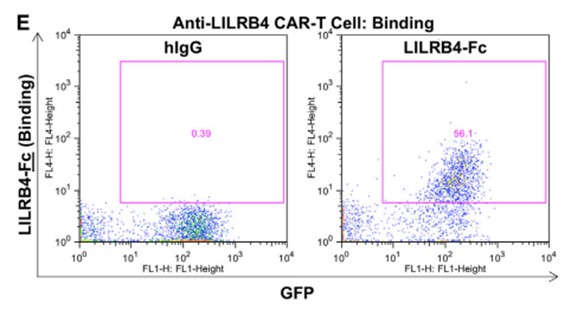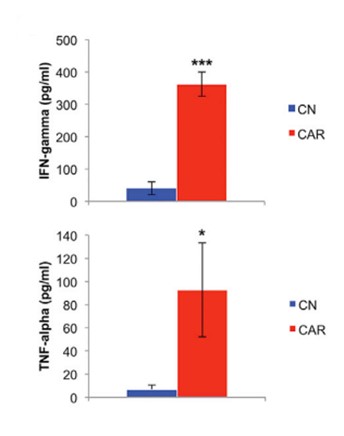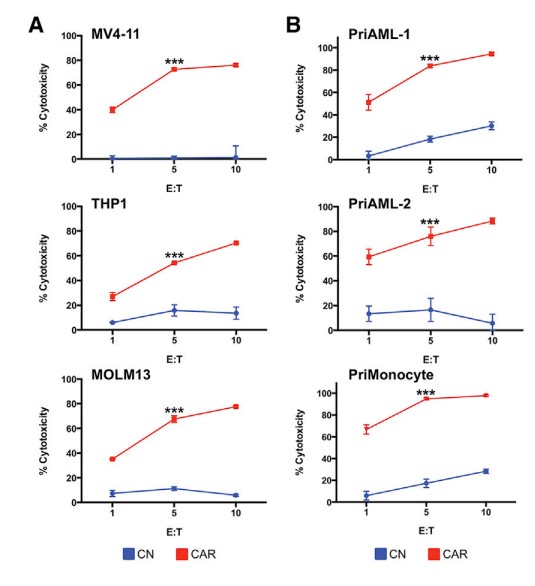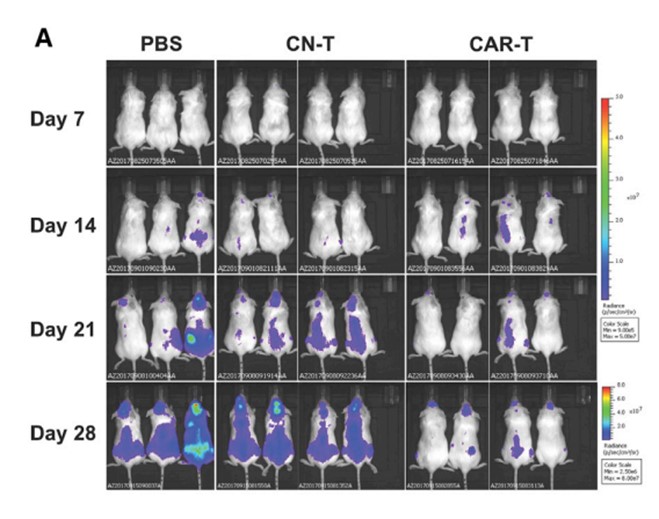All products and services are For Research Use Only and CANNOT be used in the treatment or diagnosis of disease.
Creative Biolabs provides a variety of ready-to-use and customized high-quality LILRB4 CAR products, such as vector, cell products. Please refer to the following LILRB4 CAR product list to find the products you are interested in.
Leukocyte immunoglobulin (Ig)-like receptor B4 (LILRB4) is an important inhibitory receptor that is expressed in a variety of immune cells, such as monocytes, and macrophages. LILRB4 serves as a member of leukocyte Ig-like receptors (LILRs) and binds to membrane adaptors to mediate signal pathways via many cytoplasmic immunoreceptor tyrosine inhibitory motifs (ITIMs). LILRB4 is associated with a wide range of inflammatory diseases, such as systemic lupus erythematosus (SLE), and sepsis. Based on the important role and expression panel, LILRB4 is regarded as a potential therapeutic target for a variety of diseases.
Associated Diseases
In order to meet the diverse needs of global clients for CAR design, we have developed a customer-friendly online platform for CAR design. Through this platform, you can choose the specific related modules you want to customize, such as the specific intracellular signal transduction domain, and selection markers.

Fig.1 Schematic diagram of second generation anti-LILRB4 CAR.1
Anti-LILRB4 CAR Expression Test
For the LILRB4 CAR expression test, Creative Biolabs offers several methods to verify the level of CAR expression, including but not limited to flow cytometry, western blot, and qPCR.

Fig.2 LILRB4 CAR expression detection by flow cytometry using LILRB4-Fc fusion protein.1
Anti-LILRB4 CAR-T Cytokine Release Test
Cytokines are produced and released when tumors interact with immune effector cells. In vitro cytokine release assay can effectively interpret the activation response during the incubation of CART cells with tumor cells. At Creative Biolabs, we offer a variety of cytokine tests to assist in customers' CART development.

Fig.3 Cytokine detection of LILRB4 CAR T cells co-cultured with MV4-11 cells at 1:1 E/T ratio.1
Anti-LILRB4 CAR-T In Vitro Cytotoxicity Assay
Creative Biolabs provides extensive kinds of sensitive in vitro cytotoxicity testing services to assess the functional activity of LILRB4 CART cells, including luciferase-based assay, flow cytometry cytotoxicity test, dynamic cytotoxicity analysis, etc.

Fig.4 Cytotoxicity evaluation of LILRB4 CAR T cells against different cell lines (A) or primary target cells (B).1
Anti-LILRB4 CAR-T Cell Therapy Animal Models
For in vivo assays, Creative Biolabs provides a variety of in vivo models that can be used for CART efficacy assessment, including various CDX models and PDX models, effectively shortening the overall experimental cycle of the project.
Efficacy Test of Anti-LILRB4 CAR-T
The efficacy activity of CART cells in vivo can be demonstrated in several aspects, such as the elimination of tumor growth in tumor models and the prolongation of long-term survival in tumor models. To better help customers accelerate the progress of the project, we provide one-stop in vivo testing services for global customers to evaluate the efficacy activity of LILRB4 CAR-T cells.

Fig.5 In vivo potency of LILRB4 CART cells in the MV4-11 AML CDX model.1
Reference
 Loading...
Loading...
| CAT | Product Name | Target Species | Antibody Clone | Antibody Host | Receptor Construction | Vector Type | Targeting Cell Type | CAR Vector Type | Inquiry & Datasheet |
| CAR-ZP8310 | Anti-LILRB4 (TRX385) h(CD28-CD3ζ) CAR, pCDCAR1 | Human | TRX385 | Human | scFv-CD28-CD3ζ | Lentiviral vector | T cell | ||
| CAR-ZP8311 | Anti-LILRB4 (TRX385) h(4-1BB-CD3ζ) CAR, pCDCAR1 | Human | TRX385 | Human | scFv-4-1BB-CD3ζ | Lentiviral vector | T cell | ||
| CAR-ZP8312 | Anti-LILRB4 (9B11) h(CD28-CD3ζ) CAR, pCDCAR1 | Human | 9B11 | Mouse | scFv-CD28-CD3ζ | Lentiviral vector | T cell | ||
| CAR-ZP8313 | Anti-LILRB4 (9B11) h(4-1BB-CD3ζ) CAR, pCDCAR1 | Human | 9B11 | Mouse | scFv-4-1BB-CD3ζ | Lentiviral vector | T cell | ||
| CAR-ZP8314 | Anti-LILRB4 (h128-3) h(CD28-CD3ζ) CAR, pCDCAR1 | Human | h128-3 | LILRB4 | scFv-CD28-CD3ζ | Lentiviral vector | T cell | ||
| CAR-ZP8315 | Anti-LILRB4 (h128-3) h(4-1BB-CD3ζ) CAR, pCDCAR1 | Human | h128-3 | LILRB4 | scFv-4-1BB-CD3ζ | Lentiviral vector | T cell | ||
| CAR-ZP8316 | Anti-LILRB4 (DX-446) h(CD28-CD3ζ) CAR, pCDCAR1 | Human | DX-446 | Mouse | scFv-CD28-CD3ζ | Lentiviral vector | T cell | ||
| CAR-ZP8317 | Anti-LILRB4 (DX-446) h(4-1BB-CD3ζ) CAR, pCDCAR1 | Human | DX-446 | Mouse | scFv-4-1BB-CD3ζ | Lentiviral vector | T cell | ||
| CAR-ZP8318 | Anti-LILRB4 (ZM4.1) h(CD28-CD3ζ) CAR, pCDCAR1 | Human | ZM4.1 | Mouse | scFv-CD28-CD3ζ | Lentiviral vector | T cell | ||
| CAR-ZP8319 | Anti-LILRB4 (ZM4.1) h(4-1BB-CD3ζ) CAR, pCDCAR1 | Human | ZM4.1 | Mouse | scFv-4-1BB-CD3ζ | Lentiviral vector | T cell | ||
| CAR-ZP8320 | Anti-LILRB4 (ZM3.8) h(CD28-CD3ζ) CAR, pCDCAR1 | Human | ZM3.8 | Mouse | scFv-CD28-CD3ζ | Lentiviral vector | T cell | ||
| CAR-ZP8321 | Anti-LILRB4 (ZM3.8) h(4-1BB-CD3ζ) CAR, pCDCAR1 | Human | ZM3.8 | Mouse | scFv-4-1BB-CD3ζ | Lentiviral vector | T cell | ||
| CAR-ZP8322 | Anti-LILRB4 (293623) h(CD28-CD3ζ) CAR, pCDCAR1 | Human | 293623 | Mouse | scFv-CD28-CD3ζ | Lentiviral vector | T cell | ||
| CAR-ZP8323 | Anti-LILRB4 (293623) h(4-1BB-CD3ζ) CAR, pCDCAR1 | Human | 293623 | Mouse | scFv-4-1BB-CD3ζ | Lentiviral vector | T cell | ||
| CAR-ZP8324 | Anti-LILRB4 (293622) h(CD28-CD3ζ) CAR, pCDCAR1 | Human | 293622 | Mouse | scFv-CD28-CD3ζ | Lentiviral vector | T cell | ||
| CAR-ZP8325 | Anti-LILRB4 (293622) h(4-1BB-CD3ζ) CAR, pCDCAR1 | Human | 293622 | Mouse | scFv-4-1BB-CD3ζ | Lentiviral vector | T cell | ||
| CAR-ZP8326 | Anti-LILRB4 (C84) h(CD28-CD3ζ) CAR, pCDCAR1 | Human | C84 | Mouse | scFv-CD28-CD3ζ | Lentiviral vector | T cell | ||
| CAR-ZP8327 | Anti-LILRB4 (C84) h(4-1BB-CD3ζ) CAR, pCDCAR1 | Human | C84 | Mouse | scFv-4-1BB-CD3ζ | Lentiviral vector | T cell | ||
| CAR-ZP8340 | Anti-LILRB4 (#128-3) h(CD28-CD3ζ) CAR, pCDCAR1 | Human | #128-3 | Mouse | scFv-CD28-CD3ζ | Lentiviral vector | T cell | ||
| CAR-ZP8341 | Anti-LILRB4 (#128-3) h(4-1BB-CD3ζ) CAR, pCDCAR1 | Human | #128-3 | Mouse | scFv-4-1BB-CD3ζ | Lentiviral vector | T cell |
 NEWSLETTER
NEWSLETTER
The latest newsletter to introduce the latest breaking information, our site updates, field and other scientific news, important events, and insights from industry leaders
LEARN MORE NEWSLETTER NEW SOLUTION
NEW SOLUTION
CellRapeutics™ In Vivo Cell Engineering: One-stop in vivo T/B/NK cell and macrophage engineering services covering vectors construction to function verification.
LEARN MORE SOLUTION NOVEL TECHNOLOGY
NOVEL TECHNOLOGY
Silence™ CAR-T Cell: A novel platform to enhance CAR-T cell immunotherapy by combining RNAi technology to suppress genes that may impede CAR functionality.
LEARN MORE NOVEL TECHNOLOGY NEW SOLUTION
NEW SOLUTION
Canine CAR-T Therapy Development: From early target discovery, CAR design and construction, cell culture, and transfection, to in vitro and in vivo function validation.
LEARN MORE SOLUTION